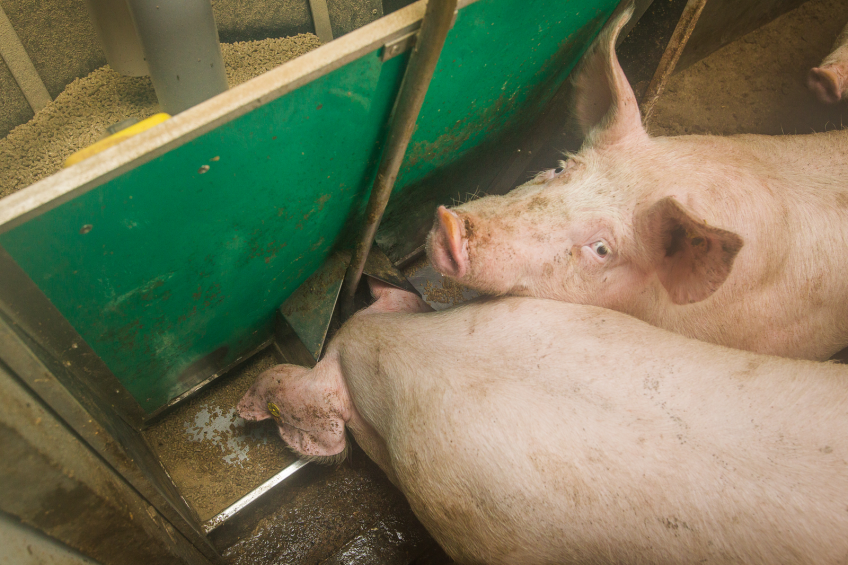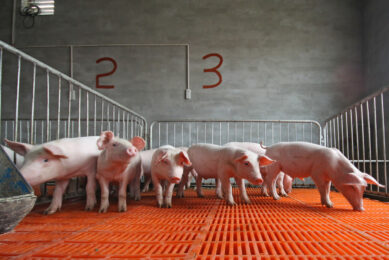Low Salmonella gut scores with 6/8-glyceride

Photo Peter Roek
Glycerides of caproic acid and caprylic acids can play an important role in enhancing pig gut health. These medium-chain fatty acids are relatively more active against Salmonella. Trials on farms support this.
Improving animal gut health by balancing the gut microbiota, minimises the risk of proliferation and overgrowth of non-beneficial bacteria. This is crucial in reducing the risk of foodborne infections. Salmonella is one of those unwanted bacteria, a pathogen for animals as well as an important pathogen in human, its presence and control in pigs is and remains an important public health issue, definitely in a world were ‘antibiotic resistance’ is a hot topic.
Decreasing the number of Salmonella shedding or carrier pigs at farms in order to reduce the risk of contaminating the carcasses with Salmonella during slaughter is one of the important ways to combat Salmonella in the pork industry.
Medium-chain 6/8 glycerides
The use of medium-chain product in animal feed shows potential in this combat. The antimicrobial action of medium-chain fatty acid has been proven in vitro. They are known to have more antibacterial action than organic acids, especially against gram-negative pathogens, like Salmonella.
Medium-chain fatty acids like caproic acid (C6) and caprylic acid (C8) are more selectively active against Salmonella than other medium-chain fatty acids. For their antibacterial effects they can rely on the classical pH-effect of acids along with their ability to disrupt the pathogens cell membrane integrity. In addition, university research has been published showing that medium-chain fatty acids (especially C6 and C8) can influence the expression of virulence genes in Salmonella and also lower the invasion sensitivity of the intestinal cells for this pathogen.
Avoid quick absorption in intestinal gut
Given the quick absorption of medium-chain fatty acids in the proximal part of the intestinal gut, it is essential that these antimicrobial fatty acids can go deeply enough into the gastro-intestinal tract (GIT). Presenting these fatty acids in a glyceride form fulfils this requirement.
Binding the fatty acids to glycerol assures a slow release effect. Upon intake of the glyceride by the animal, the lipase present in the digestive system and exogenous lipases, gradually release the antimicrobial active medium-chain compounds, so they are mainly active further down the GIT, rather than unwanted activity in the mouth and stomach.
Pig field study on Salmonella shedding
The effect of medium-chain glycerides based on caproic and caprylic acid on Salmonella contamination was assessed in a commercial pig production unit. This finishing farm of about 400 animals (open farm; one stable of 28 pens; 12 to 14 animals per pen) struggled for some time with Salmonella pressure. A control period of one finishing round was followed by a test period during which a product (0.2% AveMix MCT oil 6/8) was added on top of the applied feed of the farm. During this test period (4 fattening rounds), the supplemented feed was fed to all finishing pigs on the farms.
Monitoring the Salmonella status on-farm
The Salmonella status on the farm was monitored by determining the Salmonella shedding of the fattening pigs at slaughter age (bacteriology) and the serum antibody levels (serology). The salmonella prevalence in manure of the pigs increased during the control period from 6.5% in the beginning to 20% at the end.
During the test period with the oil supplementation, a lower number of Salmonella prevalence was observed in the pig manure at slaughter age: 2.5% and less. Same tendency was noticeable with respect to the analysed serology: The S/P-titre at the end of the control round was 0.96, during the oil supplementation period lower S/P-titres were observed (0.53; 0.45; 0.29).
An improvement of the Salmonella status was noticeable during the trial period compared to the control period, as well as compared to earlier historical data of the Salmonella status of this farm.
Trial on a closed pig farm
A similar trial performed on a closed farm (1,400 animals, trial duration: about a year), presented likewise an improved Salmonella serological status in the oil supplementation trial period and the prevalence of Salmonella remained low.
Given these results, one can conclude that in feed use of medium-chain – glycerides based on C6/C8, shows potential to reduce the Salmonella prevalence in manure in pigs and to lower the serological Salmonella status of a farm. It is clear that MCT oil 6/8 represents as a good tool in the quest for healthier animal gut and aim for a risk reduction for human salmonella outbreaks.











